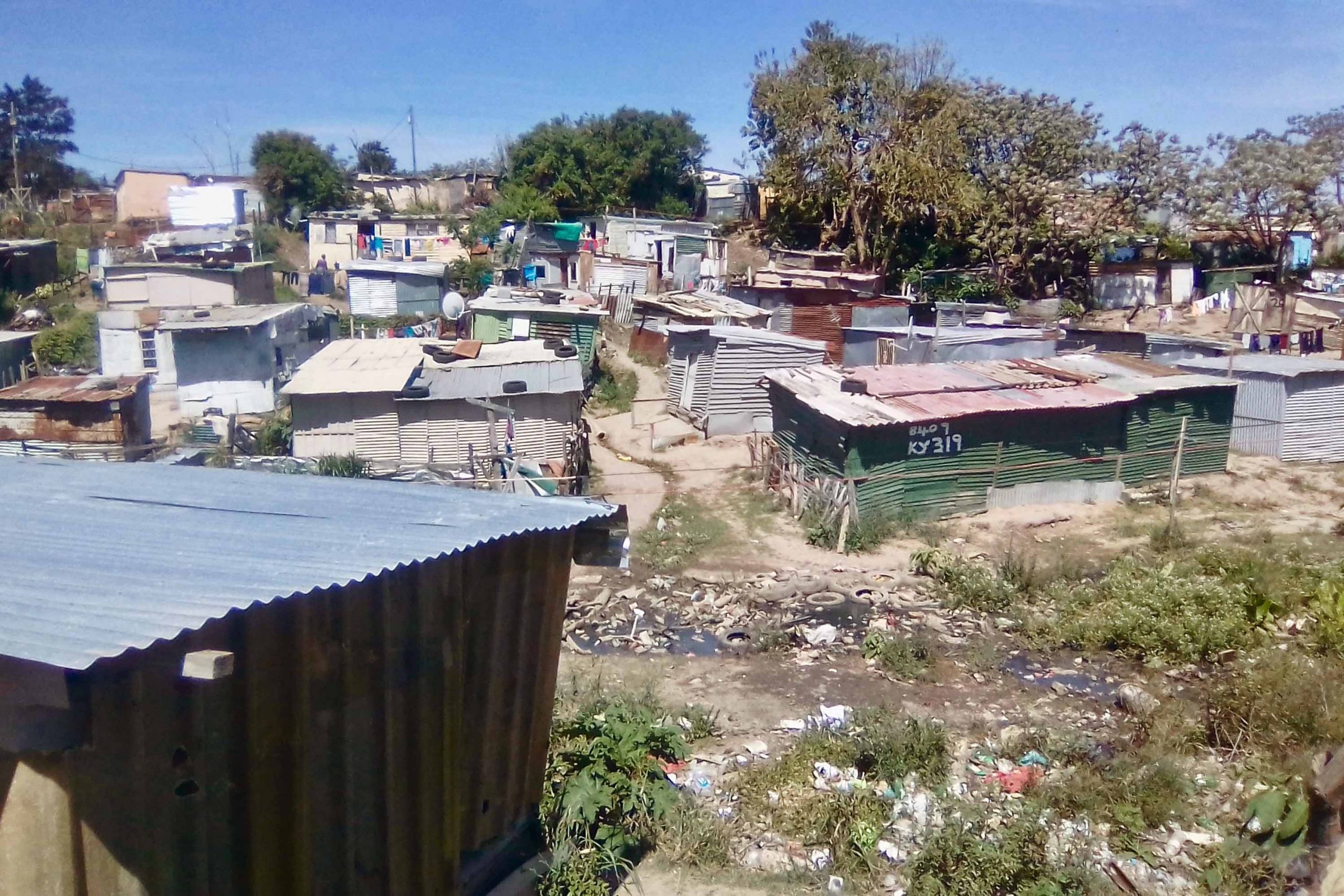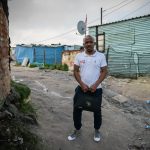Shack dwellers resist possible de-densification plans
Shack residents are concerned that possible plans to fight Covid-19 by moving people out of overcrowded settlements onto unserviced land will amount to forced removals.
Author:
6 April 2020

Government’s hurried and apparently chaotic forced removal plan is already showing signs of resistance from shack-dwelling communities.
The unexpected and sudden announcement on 25 March by the minister of human settlements, water and sanitation Lindiwe Sisulu that shack settlements would be quickly “de-densified” to stem the spread of coronavirus did not provide any details about which communities would be thinned out, how many people would be moved, and where they would be moved to.
By 28 March, department officials had convened a Zoom meeting with prominent human rights and shack dwellers organisations including the majority shack dweller organisation Abahlali baseMjondolo (AbM) and the Socio-Economic Rights Institute (Seri). AbM president S’bu Zikode was taken by surprise at the announcement in the meeting that the government wanted to move shack dwellers from Duncan Village in East London, Alexandra and Diepsloot in Gauteng and Kennedy Road in Durban before 17 April.
Related article:
“All of this was planned hastily. Who will go and who will stay, which are the pieces of land, how far is this land from the places of work, what form of shelter will be provided and how long people will be living there – we raised these questions and they were not able to provide answers. We have to guard against this coronavirus being used to evict,” says Zikode.
The organisations were told that proper consultation would follow. But on the same day, Sisulu had already approved a R340 million urban settlements development grant to the Buffalo City municipality to “de-densify” Duncan Village, East London’s major shack settlement and home to about 90 000 people.
EFF dismisses relocation plan
EFF councillors in Buffalo City immediately dismissed the plan, saying they proposed a proper de-densification strategy for Duncan Village a long time ago, identifying a piece of land nearby where numerous two-storey flats could be built. This plan, they say, had the backing of the community. EFF councillor and member of the municipal Covid-19 task team Phindiwe Kaba says council failed to act on this and the land has since been occupied by other shack dwellers.
“There is no way those people can be moved and we will never allow that as an opposition party. Now people stay in their shacks but if they are moved they will be exposed to that neighbour who was coughing. Right now, it is safe for people to stay inside. For them to go out, how sure are you that none of those people will be infected?” Kaba asks.
She says any removals in Duncan Village would require the consent of the entire council, which, like other councils, was not sitting during the lockdown.
EFF councillor Noludwe Batala, who lives in the C-Section shack settlement in Duncan Village, says, “We won’t agree to move. They can’t just come and move people. That is not going to work, in this pandemic, no.”
Contradictory positions
On 29 March, the mayor of Buffalo City Xola Pakati announced that the R340 million grant would be used partially to move Duncan Village residents to “temporary structures in locations that are yet to be identified … thus protecting the area against various social challenges including the rapid spread of the coronavirus”. But on 3 April, Pakati conceded that they were unlikely to do this during the lockdown.
“The construction is going to start immediately after the lockdown because for now there is nothing that can be done. The construction won’t block Covid-19 from spreading, even if it were to be done now,” Pakati said.
He said the municipality would move only 2 000 people from Duncan Village, and these would be in areas where urgent work was needed on leaking and rotting sewerage pipes. Pakati’s spokesperson, Sam Ngwenya, told New Frame that the 2 000 residents would be provided with the same temporary relocation dwellings as an earlier group of shack fire victims. He would not, however, say which area has been identified for this move. “We cannot reveal the exact area as experience has taught us that once we do, it might be illegally invaded. The site is big enough. Provisions for basic services, temporary roads and ablutions facilities will be made available,” Ngwenya said.
The dwellings are yet to be built, which is why no removals can take place now. “They are not the same size as a shack and they are far better than a shack to live in. As a City we do care for our communities and as such we are sensitive to their plight and would not take them from a bad state to a worse one,” Ngwenya added.
Related article:
But on 4 April, Sisulu’s spokesperson McIntosh Polela stated that removals would take place soon and that these would be “temporary” and “aimed at mitigating the impact of the Covid-19 outbreak”.
When New Frame asked him for more information, he contradicted his earlier statement and said, “We haven’t put any time frames and you are speculating about how soon we can build or move people. We haven’t said anything about building, because we aren’t building long-term structures.”
When asked if this meant the government would move shack dwellers to empty land, Polela would only say, “The exact details are going to be released once consultations are complete.”
A sham consultation
Besides the meeting held on 28 March, Zikode says there has been no consultation with Abahlali. Sisulu told Zikode that consultations would still take place and relocations would be voluntary, on a first come, first served basis.
Toilets and water standpipes are shared by many people in shack dwellings. Sometimes just one tap is used by about 2 000 people, with as few as 20 toilets for the same number of people. Shacks are overcrowded. Many of these structures are just one central space acting as a kitchen, bedroom and more, and are shared by several people. It is a normal occurrence, for example, for everyone to stand outside the shack every time one family member wants to take a bath.
A lockdown in a shack settlement requires special preparations by the government. Deliveries of bottled water, free food parcels, free data for those with smartphones, fuel for stoves and the installation of hundreds of thousands of composting toilets are just some of the steps any government would need to take if it hoped to lock down millions of shack dwellers.
De-densification ordinarily involves the establishment of new, more spacious housing developments nearby that some residents move into, while others receive dwellings in the same area. The new and bigger electrified houses and grounds are connected to water and sanitation, enhancing the personal security of families and removing the threat of death by shack fire.
Related article:
In the case of Duncan Village, which was established in the 1930s, all political parties and activist groups agree that the settlement is far too crowded.
To de-densify the area in a meaningful way would mean moving not just 2 000 people, but about 60 000. As Duncan Village is just 5km from the East London central business district, any new housing development would have to be equally close to town or attractive enough in some other way to make moving worthwhile.
The history of forced removals during apartheid also weighs heavily on the government. Duncan Village was earmarked for complete removal by both the apartheid government and the pre-apartheid goverment. In the 1960s, the apartheid government forcibly removed 112 000 residents of Duncan Village to Mdantsane, then a new township in the Ciskei Bantustan. Over the 20 years that followed, the apartheid government tried to move the rest of the residents of Duncan Village but failed, finally giving up in 1985.
De-densification forced removals may be unlawful
Tshepo Madlingozi, director of the Centre for Applied Legal Studies at the University of the Witwatersrand, told New Frame that Covid-19 de-densification removals would likely be unlawful. While the Disaster Management Act allows the state to evacuate people to temporary shelters to preserve life, this can only happen within the confines of lawful, reasonable and procedurally fair treatment.
Related article:
“We do not believe that persons can be moved to a new, temporary site without consulting them, and taking into account the amenities provided at that site – including the provision of access to shelter, electricity, water, sanitation and healthcare – as well as the distance of that site from their current dwellings for purposes of access to jobs, schooling and family life,” says Madlingozi.
He warned against the state abusing its power in the name of fighting coronavirus, saying, “We appreciate the state’s need to act swiftly to combat the spread of Covid-19, but in our constitutional dispensation we cannot allow state power to be abused in a manner that causes greater damage than that which it seeks to mitigate.”
What the government should be doing
What is the government’s plan for residents of shack settlements if the coronavirus begins spreading through these crowded areas?
Abahlali baseMjondolo has proposed that the government must immediately provide water and sanitation to shack settlements and that those who test positive for coronavirus be provided with “dignified accommodation” where they can self-isolate, in buildings requisitioned by the government.
On the possibility of moving thousands of shack dwellers to temporary relocation areas, Zikode says that any moves must be on a strictly negotiated basis. “This basis includes that the identified land should be within areas of active economic activities, with guaranteed security of tenure. All basic infrastructures must be installed. We may need a signed contract that is legal binding. Otherwise, just like the current situation in transit camps, people may be left to rot without future stability,” Zikode said.
Correction, 6 April 2020: This article previously reported that “in the meeting, Sisulu said consultations would still take place and relocations would be voluntary, on a first come, first served basis”. Sisulu said this in a separate conversation and not in the meeting mentioned.




